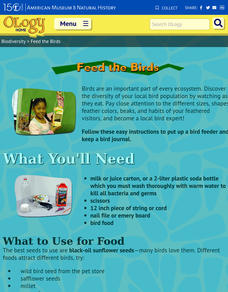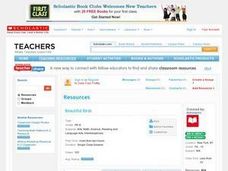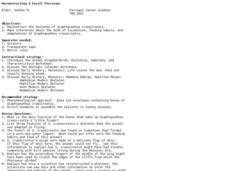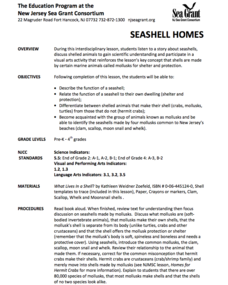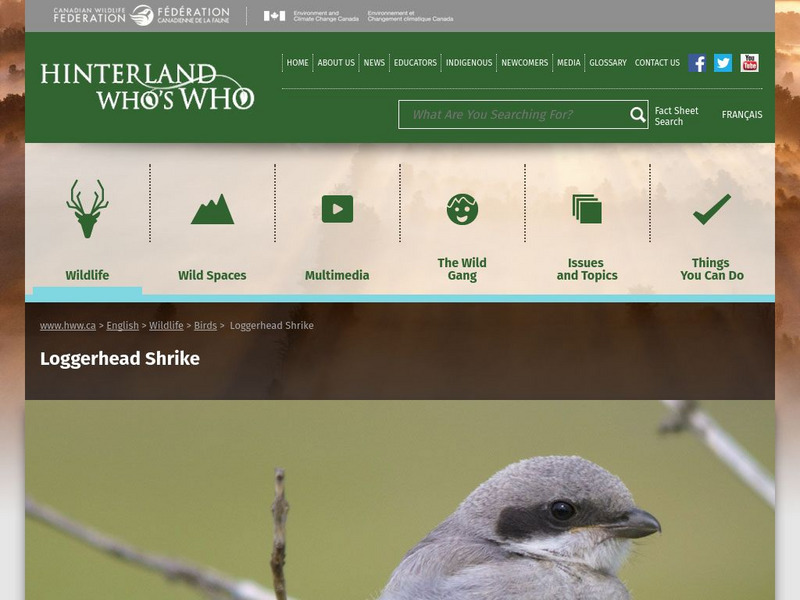American Museum of Natural History
Feed the Birds
Scholars use a large carton, string, an emery board, and bird food to create a hand-made bird feeder. After completing the craft, pupils keep a journal to track their observations.
American Museum of Natural History
Feed the Birds
What kinds of birds are common in the area? Young scientists use household supplies to create bird feeders. They then document the birds that come to their feeders by keeping journals.
Curated OER
For The Birds
Student make bird feeders and describe feeding behaviors. In this bird feeder lesson plan, students construct simple bird feeders. They then put them outside and observe the feeding behaviors of birds. Then they graph the number of birds...
Curated OER
Mystery Bird Challenge
In this mystery bird challenge worksheet, students use geographic information, feeding habits and a picture to identify a bird, with numerous links to web resources for help.
American Museum of Natural History
What's This? Feeding
Some species have pretty creative methods for catching food. Young scientists learn about some interesting ways organisms get the nutrients they need by navigating an online interactive lesson that would be suitable for a remote learning...
Curated OER
Beautiful Birds
Students engage in a lesson that is about birds while taking part in a variety of activities that are like the following. They play a game that is used for increasing memory while using bird pictures. Students also create a collage with...
Curated OER
Bird Beaks
Students discover the beaks of birds. In this biology lesson plan, students explore how many different birds can live in the same geographical area because they are adapted to eat different organisms.
Curated OER
Feeding the Birds
Students build bird feeders. In this aviary instructional activity, students build different types of bird feeders. This web page includes information on which type of feeder attracts which birds and what food to use with the certain...
Curated OER
Beautiful Birds
Students explore the traits of birds to uncover information about their eggs, feathers, beaks and other characteristics. The data is probed through a variety of exploration centers.
Curated OER
Interpreting Data from Birdfeeders
What kinds of birds live in your area? Read a book about birds to your learners and explore their feeding patterns. Charts and graphs are provided in this three page packet, but consider assigning the basic questions if using with young...
Curated OER
A Model for Natural Selection- Spaghetti Worms
Does the early bird really get the worm? If so, which color of worm does it prefer? In an exciting and easy week-long field investigation, young field biologists set up a one square meter feeding area for birds. If you have a webcam,...
Curated OER
Raptor Poster Project
Learners create posters about raptors. They synthesize information they read about raptors and select a raptor. They draw a picture of their raptor and include facts relating to where it lives, characteristics, feeding habits, size, name...
Curated OER
Dissecting Owl Pellets
Students dissect owl pellets. In this dissecting owl pellets instructional activity, students discuss birds of prey and make predictions about what they may find during the investigation. Students tease out skull and bones and try to...
Exploring Nature Educational Resources
Building A Classroom Food Web
From bears and owls to chipmunks and trees, all life depends on the sun for the energy to survive. Young biologists develop an understanding of this big idea as they arrange this series of plant and animal picture cards into food webs...
Curated OER
Reproduction
In this reproduction worksheet, students review the processes involved with sexual reproduction in animals and pollination in plants. This worksheet has 6 fill in the blank, 5 true or false, and 9 short answer questions.
Curated OER
Reconstructing a Fossil Pterosaur
Learners reconstruct the skeleton of the fossil Scaphognathus crassirostis. In this fossil lesson plan, students discuss the Kingdoms of life, geologic history and the history of the skeletons of species. Learners are given 20 minutes to...
Curated OER
Classifying Life
In this classifying life worksheet, high schoolers review the 5 kingdoms of organisms by completing 10 matching and 7 fill in the blank questions.
Curated OER
Seashell Homes
Pupils listen to a story about seashells. They discuss shelled animals. Learners describe the function of seashell. Pupils relate the function of a seashell to their own dwelling. They differentiate between shelled animals that make...
Curated OER
How Fire Affects Wildllife
In this ecology lesson, learners select an animal to study and read about how this animal adapts to ecological disaster. They complete 5 short answer questions after reading.
Other
Tulsa Walk: Birds of Prey of Oklahoma
Choose a bird of prey from a convenient drop-down menu to find out more about its conservation status, identifying characteristics, feeding habits, habitat, and nesting behaviors. Information compiled for an eighth-grade science project...
Other
Ornithology.com: Foraging and Nutrition
A very good discussion of the nutrition and feeding habits of birds.
Cornell Lab of Ornithology
Habitat Network: Winter Berries for Winter Birds
Find out about the change in diet for many bird species as the seasons change.
Canadian Wildlife Federation
Hinterland Who's Who: Loggerhead Shrike
Get the facts about the Loggerhead Shrike. While only about the size of a robin, don?t underestimate this diminutive bird. The Loggerhead Shrike is a shrewd hunter and has been known to impale its prey on thorns or barbwire. Besides...
Canadian Wildlife Federation
Hinterland Who's Who: Red Breasted Nuthatch
Get the facts about the Red-breasted Nuthatch. Besides finding a detailed physical description of this forest-found bird, you?ll also learn about some its unique facts and characteristics. Also included in this Bird Fact Sheet on the...



